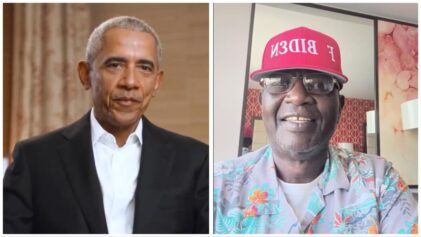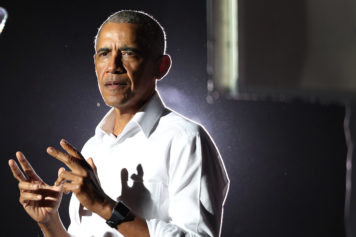The TV One two-hour special last week featuring panel discussions on the Urban League’s State of Black America report demonstrated yet again the need for an organized political movement to forcibly break through the falsely established boundaries on our analyses.
Much of the special was spent trying to alternately convince Black people that our continuing struggles are largely the result of our own behavioral choices, and, that while imperfect, the presidency of Barack Obama had us on the right track and that we must now, as the Urban League says, “Protect our progress” under Donald Trump. For two hours, between many commercial breaks, the commentators sprinted through the various ways that the state has organized to repress Black people largely through the prism of our refusal to step up, work together and take advantage of the prosperity that is there, awaiting our collective will to grab it.
The contradiction of views expressed that night represent dangerous limitations on our collective analyses and, though the panelists do not by any means represent the breadth and depth of Black thought, they do represent the imposed parameters by which much of our political discussions are measured and against which many of our struggles will have to be waged.
The problematic combination of — and relationship between — limited analyses regarding how our conditions have continued in such a horrific state and the tendency to recreate Obama’s eight years as “progress” was striking within the Urban League’s SOBA report. From the beginning, the statement from Urban League president Marc Morial gives the Obama’s administration an economic grade of “excellent” based largely on increased high school graduation rates, an economy adding 15 million new jobs and a drop in Black unemployment. This both sets an unfortunately inappropriate measuring stick for economic strength or what could be considered progress and sets a false standard of political leadership that helps inhibit moves toward a more substantive and collective advance. As was displayed during the televised panel, the analytical limitations constructed in the report and subsequent discussion of what we are to do about our collective problems in the report’s “Solution Circles” simply reaffirm and return us to old myths about “success” in a capitalist economy, while ignoring many other beautifully imaginative ideas about what is happening and what might be done in response.
Nowhere to be found in the report, and certainly not to be discussed on commercial television, are discussions of radical alternatives to economic inequality or of more accurate and, therefore equally radical, analyses of capitalism, capital itself or meaningful consideration of wealth and income inequality (or even the differences between the two). The work of Dr. Jessica Nembhard on the history and contemporary practice of cooperative economics, for one example, is not considered. Also unmentioned are the efforts of Cooperation Jackson or even, despite the insistent if limited focus on mainstream electoral politics, the previous campaign for mayor of Jackson, Miss., of Chokwe Lumumba or his son Chokwe Antar Lumumba’s successful bid for the mayoral seat in Jackson this year.
All of these represent real-time efforts to radically redistribute resources and services and to potentially threaten to upset currently institutionalized inequalities. And, yet, so much of the Black audience reached by SOBA reports, and more specifically, by its brand of limited interpretation, are never offered the chance to even consider the diversity of options, ideas at play and efforts being waged all trying to address a common problem. The range of discussion or analysis is too narrowed by conventional and well-supported (sponsored or “partnered”) political leadership (as it were) assuring that any promoted action will be equally limited in its positive impact.
In an attempt to expand the debate, I reached out to Morial and two critical voices on the State of Black America report, journalist and host of “Breaking Brown” Yvette Carnell and attorney and writer for Inequality.org and The Huffington Post, host of “Tone Talks” Antonio Moore. Both Carnell and Moore have asserted themselves as leading political analysts and critics of conventional approaches to economic or financial “literacy.” I asked all three to respond to my initial criticism that an economic grade of “excellent” was inappropriate given that the variables used to reach such a conclusion do not take into account what are more genuine factors, specifically wealth, and that during Obama’s presidency, there was an actual worsening of Black material conditions, an increasing of the percentage of wealth held by the country’s top 1 percent and a poverty rate that was actually higher than under President Reagan.
Carnell wrote in response that, “According to a recent report in Washington Monthly, the per-capita number of Black employers, for example, declined by some 12 percent just between 1997 and 2014.’ The Obama administration’s Small Business Administration gave only 1 percent of its loans to African-Americans. Prior to the bailouts, Obama didn’t audit the banks and tie Black lending to bailout dollars. That’s not success. That’s a failure of the first Black president to address the economic needs of the Black community.”
Moore added, “Black wealth is regressing. Morial and the Urban League went from calling their report ‘Locked Out’ in 2016 to ‘Protect Our Progress’ in 2017. [This] doesn’t make much sense. The index the Urban League is releasing is not reflective of realities of Black life. … According to reports, a Black single mother is worth a mere $5, incarceration of African-American males is among the highest rates ever recorded in the first world and the median Black family is worth $1,700 without depreciating assets. Nothing here reflects economic progress since Black people “won” Civil Rights in this country in the mid 1960’s. Black wealth is nearly nonexistent. We control 2.6 percent of personal wealth, which is not enough to live the ‘American dream,’ no matter how many times they release equality indexes that state otherwise.”
Morial responded with the following:
“Our scorecard on the Obama Presidency evaluated a wide range of achievements and policy positions. As we noted, President Obama was awarded our second-highest rating (“superior” being the highest). While we recognized his administration’s significant successes, we also took issue with what we saw as its failures, such as missed opportunities to appoint an African-American Supreme Court Justice and a lack of relief for underwater and seriously delinquent homeowners. We rated his administration as only “fair” on issues such as gun violence and bank closures in low-income neighborhoods. We also conducted our assessment within the context of his challenges: He inherited the worst economy since the Great Depression and was faced with unprecedented Congressional opposition. You’ll find as you read beyond the headline that our analysis was comprehensive and nuanced. His administration was rated against other presidential administrations, not against a nonexistent perfect administration.”
Further Moral states, “As a national civil rights organization focused on racial justice and economic opportunity, we evaluate the status of African-Americans based not only upon overall progress, which was significant during the Obama Administration, but also upon the still-sizable gap between Black and white America. Our focus on the State of Black America is based upon what we see as the most urgent priorities facing Black America. During times when measurable progress is being made, we see it as our main responsibility to focus on eliminating the gaps. Progress under Obama was certainly not as rapid or as encompassing as we would have preferred, and we made our frustrations known. However, the Obama Administration saw real, measurable movement forward. Now in 2017, we are in danger of moving backward rapidly. We see as our most urgent priority resisting the social and economic threats posed by the Trump Administration’s budget proposals and actions by the Justice Department that would hinder voting rights and erode progress on police reform.”
It is, of course, important to do as Morial says, and read beyond the headline. However, headlines are important in that they grab attention and also set a frame for what follows. In this case, the established frame seeks to falsely set previous presidencies as a standard for Obama’s, then (always ignoring those first two years of his own party controlling both houses) suggesting what held him up were those same previous presidencies and then “unprecedented Congressional opposition.” Such a frame certainly allows for conclusions that speak more to the interests of the SOBA report’s corporate “partners” than Black people themselves.
Hence, the report’s “Solution Circles” which focus mostly on financial and housing counseling, engaging Black entrepreneurship or being better consumers and increasing credit ratings, are retreaded ideas that have never been enough reverse the Black economic plight. The “solutions” offered by the Urban League represent that same kind of neoliberalism and bootstrapping ideas that encourage us to vote for a candidate like Barack Obama. Obama becomes an answer to everything and Black people get blamed for us ending up worse off than where we started. This approach argues that an absence of progress is due to our inability to just “get it together.”
Inequality is not behavioral, it prescribes behavior. Solutions can come only from “financial literacy” being redefined as a deep analysis of capitalism as an economic and social system. Then forming militant political organization to undue the damage and set us on a new course. We absolutely should compare “our” politicians to “nonexistent perfect” administrations, precisely to prevent our analyses and subsequent actions from being shackled to those developed by the very people who would have us remain as we are forever.


